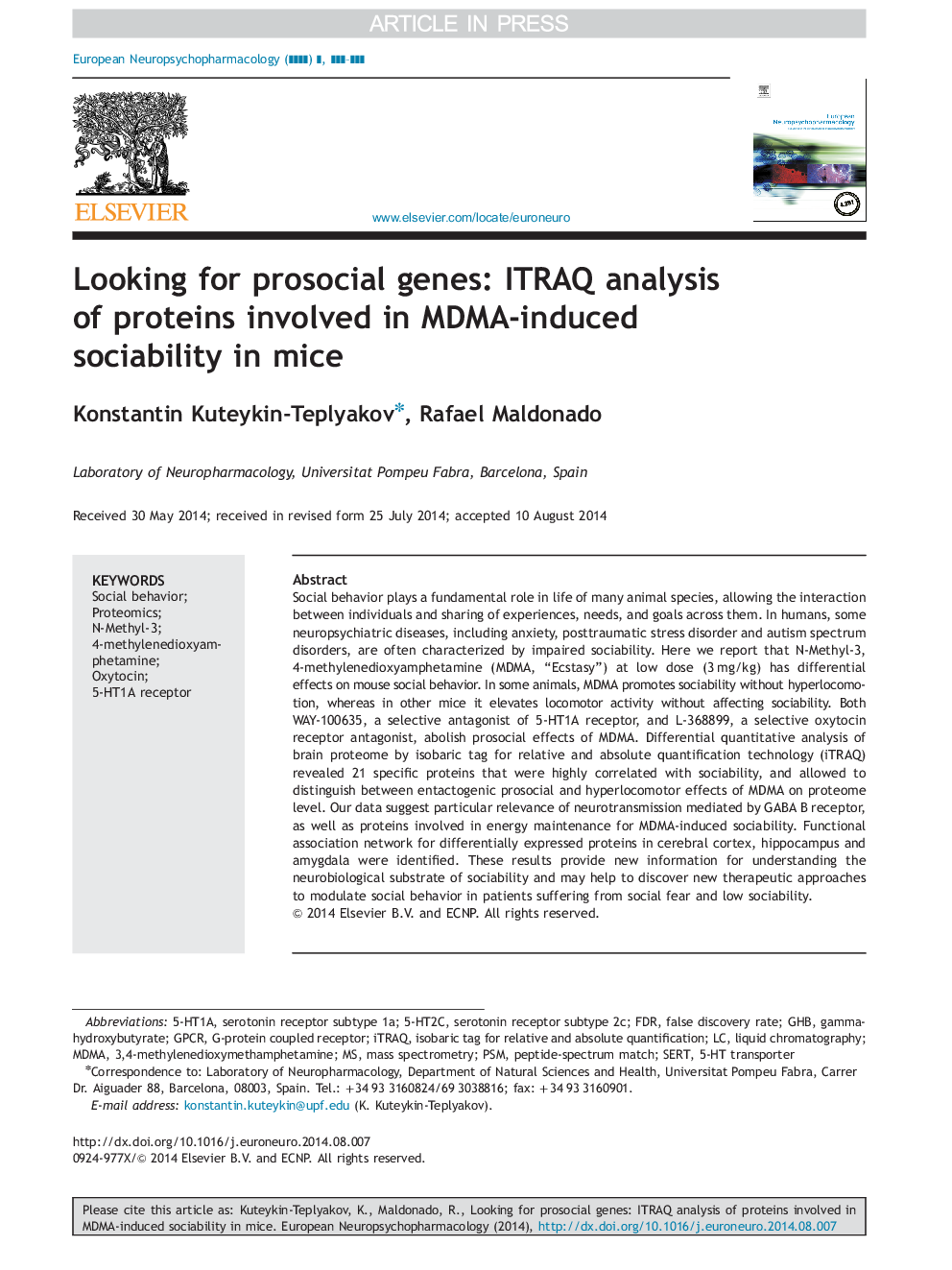| کد مقاله | کد نشریه | سال انتشار | مقاله انگلیسی | نسخه تمام متن |
|---|---|---|---|---|
| 10299142 | 539691 | 2014 | 11 صفحه PDF | دانلود رایگان |
عنوان انگلیسی مقاله ISI
Looking for prosocial genes: ITRAQ analysis of proteins involved in MDMA-induced sociability in mice
دانلود مقاله + سفارش ترجمه
دانلود مقاله ISI انگلیسی
رایگان برای ایرانیان
کلمات کلیدی
5-HT2Cpeptide-spectrum matchPSMITRAQMDMA5-HT1AGPCRFDRGHB3,4-methylenedioxymethamphetamine - 3،4-methylenedioxymethamphetamine5-HT1A receptor - 5-HT1A گیرندهG-protein coupled receptor - G-پروتئین همراه گیرندهoxytocin - اکسیتوسینisobaric tag for relative and absolute quantification - برچسب ایزوباریوم برای اندازه گیری نسبی و مطلق5-HT transporter - حمل کننده 5-HTsocial behavior - رفتار اجتماعیSERT - سختMass spectrometry - طیف سنجی جرمیfalse discovery rate - میزان کشف کاذبProteomics - پروتئومیکسliquid chromatography - کروماتوگرافی مایعGamma-hydroxybutyrate - گاما هیدروکسی بوتیرات
موضوعات مرتبط
علوم زیستی و بیوفناوری
علم عصب شناسی
روانپزشکی بیولوژیکی
پیش نمایش صفحه اول مقاله

چکیده انگلیسی
Social behavior plays a fundamental role in life of many animal species, allowing the interaction between individuals and sharing of experiences, needs, and goals across them. In humans, some neuropsychiatric diseases, including anxiety, posttraumatic stress disorder and autism spectrum disorders, are often characterized by impaired sociability. Here we report that N-Methyl-3,4-methylenedioxyamphetamine (MDMA, “Ecstasy”) at low dose (3Â mg/kg) has differential effects on mouse social behavior. In some animals, MDMA promotes sociability without hyperlocomotion, whereas in other mice it elevates locomotor activity without affecting sociability. Both WAY-100635, a selective antagonist of 5-HT1A receptor, and L-368899, a selective oxytocin receptor antagonist, abolish prosocial effects of MDMA. Differential quantitative analysis of brain proteome by isobaric tag for relative and absolute quantification technology (iTRAQ) revealed 21 specific proteins that were highly correlated with sociability, and allowed to distinguish between entactogenic prosocial and hyperlocomotor effects of MDMA on proteome level. Our data suggest particular relevance of neurotransmission mediated by GABA B receptor, as well as proteins involved in energy maintenance for MDMA-induced sociability. Functional association network for differentially expressed proteins in cerebral cortex, hippocampus and amygdala were identified. These results provide new information for understanding the neurobiological substrate of sociability and may help to discover new therapeutic approaches to modulate social behavior in patients suffering from social fear and low sociability.
ناشر
Database: Elsevier - ScienceDirect (ساینس دایرکت)
Journal: European Neuropsychopharmacology - Volume 24, Issue 11, November 2014, Pages 1773-1783
Journal: European Neuropsychopharmacology - Volume 24, Issue 11, November 2014, Pages 1773-1783
نویسندگان
Konstantin Kuteykin-Teplyakov, Rafael Maldonado,